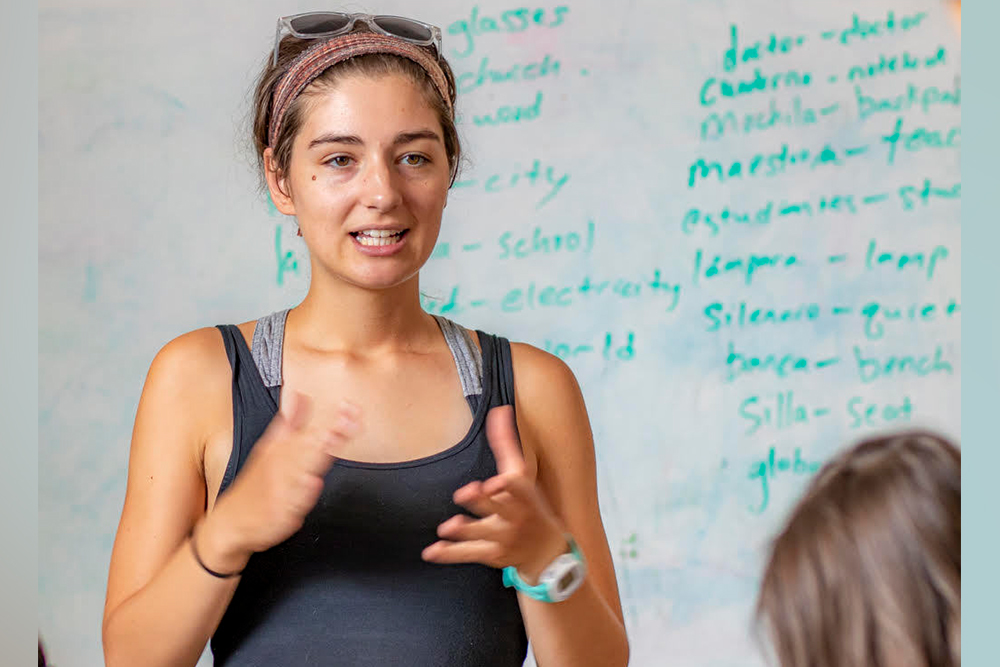It was on her cross-cultural semester, in the spring of 2018, in the jagged, rocky hills of the Sonoran desert, when Eastern Mennonite University (EMU) Spanish and writing studies double-major Elizabeth Nisly knew she was called to the field of immigration justice. Her group spent a week with Frontera de Cristo, a Presbyterian, “binational border ministry” that works in the neighboring cities of Agua Prieta, Mexico and Douglas, Arizona.
“They made an issue that had seemed very black and white have a lot of nuance, basically drawing out the humanity in the border story and the people who decide to cross, and also the people who decide to police it,” Nisly said. She felt then, “I need more of this.”
Nisly went on to intern last summer with Frontera de Cristo: working on the website and newsletter, teaching English, and creating programming for children whose families were waiting for their asylum case to be heard.
This semester, she is an intern with the Catholic Charities Immigration Legal Services while at EMU’s Washington Community Scholars’ Center (WCSC).
“It’s exciting to be in a place where everybody really believes in the work they are doing,” Nisly said.
Interns and immigration
She’s not the only student at WCSC this semester gaining professional experience in the immigration field. James Dunmore, a liberal arts major, is working with LA RED, a platform of Faith in Action. He’s travelled for trainings twice: In late January, to New Mexico to participate in demonstrations with faith leaders and activists at a processing center and in mid-February, to Las Vegas.
In Washington D.C for 40 years, the WCSC program has cultivated strong connections with nonprofits serving the Latinx population.
“We have students interacting with Latin American immigrants every semester within a variety of fields,” said WCSC co-director Kimberly Schmidt. “Last semester, an accounting major worked at Latin American Youth Center, a nursing major was at La Clinica del Pueblo, and social work majors were with Catholic Charities Immigration Legal Services and Ayuda.”
Nisly spends her days in D.C. translating legal documents, researching cases, and interpreting for clients. She works alongside a volunteer attorney and a law student, lending her Spanish skills to their “legalese.”
“It’s a good outlet for the general anxiety I feel about our immigration system,” said Nisly. “Yes, it is still a scary and terrible system, but at least I helped a client communicate with their lawyer today, or at least I translated a document to help with a case. At least I’m learning about what it takes to help people navigate this system.”
Summer in the borderlands
Nisly saw firsthand last summer how difficult it is for migrants to navigate the immigration system. Her time with Frontera de Cristo, looking after the children at the U.S.-Mexico border, was by turns a joyful and sorrowful experience. She has stacks of drawings that the children made for her.
“They are bursting with energy and creativity,” Nisly wrote in a newsletter article for the organization. “They have dreams: one wants to be a teacher, another a doctor. One little girl drew a picture of the school she will teach in one day. It’s surrounded by flowers and apple trees.”
Other classes were taken over by the shadows that haunted the childrens’ families. Nisly remembered one boy saying that he was frightened, because there were men who wanted to kill his father.
“That’s a lot of weight for a six-year-old,” Nisly said. “And then the other kids started sharing stories of trauma.”
The asylum seekers generally waited at the border for about seven weeks to enter the United States. After entering, their asylum cases can take up to multiple years to be resolved. Sometimes, Nisly would serve as a chaperone for the families camped out at the border, using her presence as an American citizen to protect them from being targeted by the cartels for kidnapping or other exploitation. Throughout all these experiences, and wherever Nisly ends up after this semester, “I hope that whatever I end up doing helps the people coming to the U.S. to maintain their dignity and humanity.”
2/14
